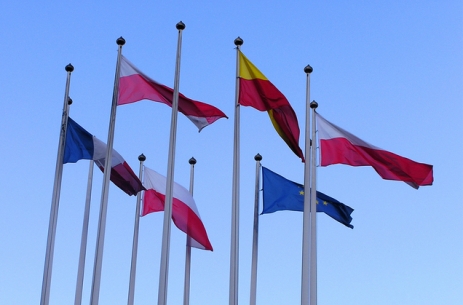
One of the consequences of Europe's current migration crisis has been the unearthing of matters which many had hoped were long laid to rest. For instance, not long after refugees started pouring over the borders of Greece, Italy, Hungary and the like while vehemently chanting they are Germany bound, old concerns regarding each country's freedom to secure its own frontiers and decide whether they are willing to accept an abrupt surge in demographics came up. Some nations refused the imposed migrant quarter because of such demographic and economic concerns.
Eastern Europe was among the regions of
the EU which took issue with the migrant quarters. Countries like
Hungary, the Czech Republic, Poland, Slovakia and Bulgaria have build
barbed wire fences in order to keep out unwanted migrants, while
Germany has temporarily reinstated border controls.
As such, there have been speculations as to how Romania and Bulgaria might be trying to use the migrant crisis as a bargaining chip to get into the Schengen Agreement. Some adamantly believe this is the case while others argue that the two nations see themselves as quite lucky to not be part of the Schengen Agreement and, even the Eurozone at this particular moment.
Without Schengen and Eurozone membership, Romania and Bulgaria do not benefit from all the advantages which might be made available to them if they were included in these structures. On the other hand, they are also not subject to the problems which are inextricably tied to such associations.
The Convention Implementing the Schengen Agreement was signed on June 19th 1990 and entered into force in 1995. This allowed for all member states of the Agreement to enjoy free movement of the population without any border controls.
Member states of Schengen are Austria, Belgium, Czech Republic, Denmark, Estonia, Finland, France, Germany, Greece, Hungary, Iceland, Italy, Latvia, Lithuania, Luxembourg, Malta, the Netherlands, Norway, Poland, Portugal, Slovakia, Slovenia, Spain, Sweden, Switzerland, Liechtenstein. Not all Schengen member states are EU members though.
Great Britain, Cyprus and Ireland have not joined the free border area, even though they are EU states.
Schengen as a priority
President Klaus Iohannis stated recently that the Schengen Area is a national priority: “ We agreed upon an active bilateral and constructive dialogue with European partners in order that we may reiterate the arguments concerning the opportunity and justness of a prompt decision regarding access to Schengen, seeing as how we have met all necessary criteria.”(1)The European Commission did indeed state that Romania and Bulgaria have met all the requirements. Notwithstanding, they added that the actual decision to let in the two nations in is a political one which can only be made by the Council of the European Union and the European Council.(2)Contrary to the president's statement, Prime Minister Victor Ponta declared that Schengen is no longer a national priority and that, since it was quite obvious that a decision regarding this subject would not be favorable, as all member states need to vote unanimously for another to enter the Agreement, Romania will be withdrawing its bid to join Schengen this year.(3)
Current Schengen debate
There are several states which do not want Romania and Bulgaria to enter Schengen. Among these are France, Holland and Germany. It is obvious that the situation is not likely to change soon. But just how unfortunate is it really to not be part of the free border agreement?
There is the obvious advantage of open borders, with no controls upon entry or exit. This is advantageous for tourism and commerce, unfortunately not so much for national security.
Since the agreement creates a common multinational border instead of the old individual national frontiers, it is quite hard to keep records of transnational criminal activity.In the context of the current refugee crisis the very idea of open borders gives rise to controversy.People can move freely between Schengen area states, therefore choosing which ones they want to live in and which they should avoid, like the case of refugees preferring Germany, Sweden and the like to most other countries. All states, however, are obligated to share in the burden of caring for these unfortunate victims of war with as much fervor and as many resources as the nations which are preferred by refugees.
This scene seems set for discord. Yet Romania still finds itself talking about the Schengen desideratum. Meanwhile, some states are questioning the very effectiveness and utility of the idea. At the same time they are ironically debating over whether or not Romania should be “allowed access” to it.
At this particular moment in time it might be said that most Romanians could be looking at Schengen as more of a curse than a blessing. And the point can be made that, since the country is not dealing with the same overwhelming amount of people crossing its borders, stirring up anxieties with regard to the demographic, economical, legal and political future of the nation, as is currently the case around free border Europe, perhaps it is a good idea to reconsider the effectiveness of this idea in its current form altogether.
The discussions surrounding this crisis have ranged from the dangers of Islamic fundamentalists taking advantage of refugees' desperate situation in order to recruit them for their terrorist activities, to some countries only accepting migrants if they are of the Christian faith, fearing a surge in Islamic demographics which, they argue, would not be comfortable in a primarily Christian state that can offer them so little in terms of religious amenities. There have even been talks about bringing back the nation state and dissolving the EU in its current format.
Romania is not part of Schengen. These discussions are not taking place in this country. Although it will be taking in its share of refugees, the general opinion is that they will not stay, as the state is not as generous as others when it comes to social benefits.
The eurozone
Another membership Romania has been struggling to attain has been that of the eurozone. This economic desideratum has been present in the country's plans since it entered the EU in 2007. So far, however, it has not been able to meet all the necessary criteria demanded by EU legislation in order to be able to achieve this goal.
This sounds as if the country is lacking in some economic aspects. No doubt it is. And yet, is not being part of the eurozone as tragic as some might want to believe?
Being part of this system implies that Romania would have to transfer its power of decision with regard to monetary policy to the European Central Bank. Some might conclude this would be a smart choice as EU policies would improve the country's economy.
Others, on the contrary, would point out that the European Central Bank (ECB) is too economically, culturally and legislatively removed from Romania and cannot therefore relate to its issues or necessities.
Examples of countries faring well and not so well under the ECB's rule can be provided to make both cases.
And perhaps both sides would have valid arguments. The reality of the matter is that, even though states like the Netherlands, Germany, France, and Belgium are doing well economically, as they have mostly been doing, others such as Portugal, Italy, Ireland, Greece and Spain are faring as bad as they possibly could.
In fact, the most heated debate centered around whether or not a country should continue being part of the eurozone took place recently when Greece took a vote on the matter. The idea of letting countries handle their own monetary policy had been present in most political and economic analysis circles for quite some time. On this occasion, with Greece so close to defaulting on its debt, the scenario of an exist ( or what came to be known as the potential Grexit) came close to becoming a reality. It did not. At least not yet, since the injection of new money into its economy might only prove to be a temporary solution.
When it comes to Spain, Portugal, Italy and the rest of the countries that have been feeling the crisis more intensely than others, the transient nature of the ECB's help becomes obvious. Would they not be better off fine tuning their own economic and monetary policies?
Whatever answer one gives to these queries, it is important to be able to have the discussions, rather than ignore all but the most positive outcome.
Perspectives
Whatever one's opinion is on the subject of the Schengen Agreement and the Euro-zone, their effectiveness, utility and potential to boost either national pride or an indentured servitude mentality, it is important to keep in mind that no strategy can be successful if it does not include multiple scenarios.
In the end it is a struggle, perhaps even a 'war' that nations are fighting, together, in order to build a safer, more stable and united society. In order to do so, however, strategies which take into account several outcomes are necessary.
We know what the future looks like as part of the EU. But can Europe see a way to survive a potential change in its current state?
As for Romania, one must wonder if it would not be wise for it to have a backup plan,not just at this time when anxieties and tumultuous debates between Europhiles and Euroskeptics have grasped the heart of Europe, but always. This is not to say that a completely integrated EU future is not in sight, but, perhaps the country should consider that, as Sun Tzu so explicitly put it: “Tactics without strategy is the noise before defeat. “
Article by: Georgiana Constantin
Sources:



 October 14, 2015 14:40
October 14, 2015 14:40 










